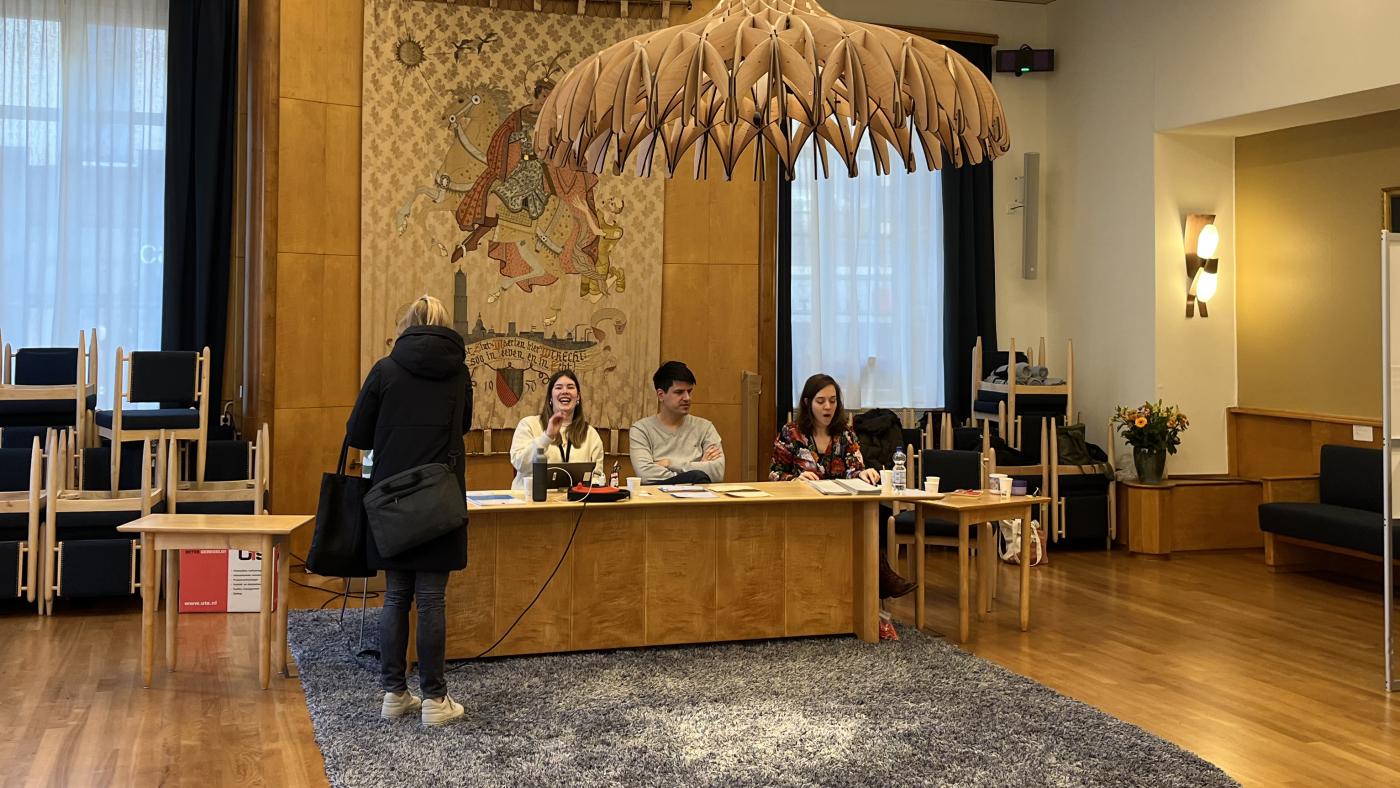From early in the morning until late at night
Students happy to work at polling stations

It's 6:45 am and Jennie Overbeek (18) is reporting to the polling station at the Town Hall, in the city centre. The day is March 15, 2023, when Dutch citizens voted for their provincial council and the water board. A long wait awaits Jennie, who is doing this job for the first time. She learned about it online. "I thought: I don't have anything planned that day anyway, so why not?"
Jennie has several tasks at the polling station. She checks people's IDs, scans the ballots and distributes red pencils (that's what the Dutch traditionally use to cast their vote, Ed.). She notices that her work is valued. Some of the voters even give her snacks. "Some people brought me food. They said: 'The supermarket is nearby, do you guys want anything? Two people gave us a whole bag of candy."
Once the station is closed, at 9:00 pm, it's time to count the votes. The trashcans holding all the ballots are flipped upside down. "It's just a gigantic pile of paper," says Jennie. Six additional people arrive to help with counting. She remembers that most of them were students. "They were people my age, who studied all sorts of things: Economics, Law..." The invalid votes are thrown away while the valid ones are sorted. At 1:30 am, she is finally able to go home.
A contribution to democracy
Jennie will be counting votes once again this Wednesday, November 22, in the elections for the House of Representatives. She is one of the 3,000 volunteers who will either spend the day at a polling station or help count the votes in Utrecht. Approximately 20 percent of the volunteers are aged 18 to 23. That's 580 people. Four of them are Jennie's friends. "I told them that I enjoyed myself last time and they said: 'I didn't know I could do that!' It looks like not a lot of people do."
Jennie only found that out because she's interested in politics. She studies Administrative & Organisational Sciences at UU and enjoys watching how the voting process goes. "You kinda know who won even before the official results are announced because you can see who got the most votes at your polling station. The results were pretty much aligned with what we saw in Utrecht." In addition, the students says that working at a polling station makes her feel like she's contributing to Dutch democracy.
But it’s not just students from the Faculty of Law, Economics & Governance that serve at polling stations. Marjanna Romers (29) studies Medicine and helped count votes for the national elections in 2019. She would have done it again this year if only she’d been available. “I enjoyed getting a little bit involved in society like that. You’re paid to do it, but mostly it’s fun.”
A little extra money
Yes, you do get some money to perform this job. Everyone who volunteers receives a paycheck. Jennie was supposed to get 180 euros in March for working both during the day and in the evening. But, since counting the votes took longer than expected, she ended up getting 210 euros. Counters receive 40 euros, deputy chairs get 220 euros and chairs get 240 euros. The latter is a function that you can only hold if you’ve already served as deputy chair. To be able to work at a polling station, you also need to complete an online course first.
“I wouldn’t do it if I didn’t get paid, because it’s such a long day,” says Berend Kuling (19), a second-year student of Management & Organisational Science. He is a classmate of Jennie’s. “I think it’s justified to get paid if you have to work such long hours.” But he swears that working behind the scenes is what motivated him the most. “I was able to vote for the first time in the Provincial elections. But you walk in and then you walk out. I think it’s interesting to see how democracy works and contribute to it a little bit.” So much so that he will be missing a lecture just to work in the upcoming elections. “I think this is a much more unique experience and it matters more than a lecture that I’ll always be able to watch later.”
Excited
He registered as a volunteer on the last day it was possible to do so: October 22. He will be working at Stadsboerderij Griftseede, one of the last locations that still needed volunteers by then. It looks like many people were excited to volunteer this year. “Finding volunteers for this year’s elections worked like a charm,” says Femke van der Meij, Communication Advisor for the municipality of Utrecht. “We’ve already filled all counter spots, there is even a waiting list.” Recruiting volunteers doesn’t always go so smoothly, she notes. “It looks like people really care about the elections this time.”
The process of counting the votes is public, so everyone can watch it on Wednesday evening.